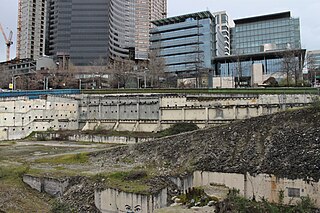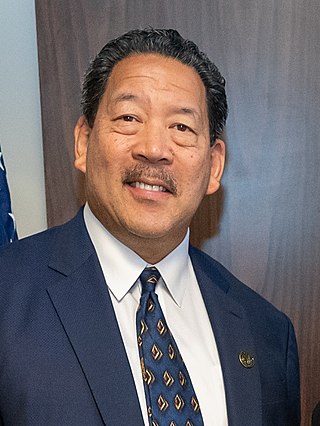A poll tax, also known as head tax or capitation, is a tax levied as a fixed sum on every liable individual, without reference to income or resources. Poll is an archaic term for "head" or "top of the head". The sense of "counting heads" is found in phrases like polling place and opinion poll.

3rd & Cherry, formerly Seattle Civic Square, is a planned 629-foot (192 m) tall, 57-story skyscraper in downtown Seattle, Washington, United States. The residential high-rise, located near Seattle City Hall and the Seattle Civic Center, will have 520 condominiums and amenity spaces, including a public plaza at ground level and retail spaces. It was originally proposed in 2007 but has been delayed due to political and financial issues, undergoing several redesigns under various developers. It is set to be built by Bosa Development and open in 2026.

Bruce Allen Harrell is an American politician and attorney serving as the 57th and current mayor of Seattle, Washington. He was a member of the Seattle City Council from 2008 to 2020. From 2016 to 2020, he was president of the city council. He was acting mayor of Seattle from September 13 to 18, 2017. He was elected mayor in his own right in the 2021 Seattle mayoral election, becoming the second Black mayor since Norm Rice, and the first African-Asian American mayor of the city.

Michael McGinn is an American lawyer and politician. He served as mayor of the city of Seattle, Washington, and is a neighborhood activist and a former State Chair of the Sierra Club.

Jenny Anne Durkan is an American attorney, former federal prosecutor, and politician who served as the 56th mayor of Seattle, Washington. She is the daughter of Martin Durkan. Durkan is a member of the Democratic Party. After earning her Juris Doctor from University of Washington School of Law in 1985, Durkan began practicing law as a criminal defense lawyer and civil litigator. In October 2009, President Barack Obama appointed her United States Attorney for the Western District of Washington. She held that position until September 2014.

Timothy L. Burgess is an American journalist and politician from Seattle, Washington. He was a member of the Seattle City Council from 2007 to 2017, and served as Mayor of Seattle for 71 days in late 2017. Prior to his political career, Burgess was a radio journalist and Seattle Police Department (SPD) officer.

Kshama Sawant is an Indian-American far-left politician and economist who served on the Seattle City Council from 2014 to 2024. She is a member of Socialist Alternative, the first and only member of the party to date to be elected to public office.

Lisa Anne Herbold is an American politician. She serves on the Seattle City Council representing the 1st District, which covers part of West Seattle. She was first elected in 2015 after narrowly defeating Shannon Braddock, and was sworn into office on January 4, 2016. She was reelected in November 2019.

The 2017 Seattle mayoral election was held on November 7, 2017. It was won by former U.S. Attorney Jenny Durkan, who beat civic activist Cary Moon in the general election by 15 percentage points. The two candidates had advanced from an earlier primary election held in August, which ensured that Seattle would have its first female mayor since Bertha Knight Landes was elected in 1926. Municipal elections are officially nonpartisan though most candidates have declared party affiliations.
Richard Hedreen is a Seattle-based hotel and property developer and art collector. He is the founder and chairman of R.C. Hedreen Co., which was founded in 1963. R.C. Hedreen Co. has built the Seattle Hilton Hotel, the Grand Hyatt, the Olive 8, the Hyatt Regency Seattle and other Seattle skyscrapers. On March 13, 2024 it was announced by Seattle University via the Seattle Times and New York Times that Hedreen would be donating his art collection, valued at $300 million, to Seattle University, making it the largest gift of art ever made to a university.

Amazon HQ2 is Amazon's corporate headquarters in Crystal City, Arlington, Virginia and is an expansion of the company's headquarters in Seattle, Washington. Phase I, which has capacity for 14,000 employees, opened in June 2023. Construction on Phase II is delayed and there is no timeline for development.

Carol Consuela Moon is an American political activist who was part of the campaign to re-open Seattle's waterfront after the replacement of the Alaskan Way Viaduct. Moon was a candidate for Mayor of Seattle in the 2017 mayoral election, finishing second in the primary and advancing to face Jenny Durkan. During the general election, she trailed Durkan in preliminary results and conceded.
Denise Ritsuko Moriguchi is an American businesswoman who currently serves as the president of Uwajimaya since 2016 and as its CEO since 2017.

Tammy Janine Morales is an American politician from Seattle, Washington. She was elected to represent District 2 on the Seattle City Council in November 2019.

Daniel Aaron Strauss is an American politician who serves on the Seattle City Council from District 6. A native of Seattle's Ballard neighborhood, he previously worked as an aide to local politicians, including Seattle councilmember Sally Bagshaw.

Andrew Joseph Lewis is an American politician and attorney who served as a member of the Seattle City Council from District 7. He was an assistant city attorney prior to his election to city council, and also worked on political campaigns.

Alex C. Pedersen is an American politician and former member of the Seattle City Council. He represented Seattle's District 4, which includes Wallingford, the University District, and Sand Point, from November 2019 until completing his term of office in December 2023. Previously, Pedersen was an aide to city councilmember Tim Burgess and a private sector housing finance analyst.

The city of Seattle experienced protests over the murder of George Floyd in 2020 and 2021. Beginning on May 29, 2020, demonstrators took to the streets throughout the city for marches and sit-ins, often of a peaceful nature but which also devolved into riots. Participants expressed opposition to systemic racism, police brutality and violence against people of color.
Carl Raymond Haglund is the president of Columbia Modern Living, a property management and real estate development company based in Seattle. Haglund has been criticized for his actions as a landlord and a Seattle law prohibiting landlords from raising rents on properties that do not meet maintenance standards is popularly known as the "Carl Haglund law".

The 2021 Seattle mayoral election was held on November 2, 2021, to elect the Mayor of Seattle. It was won by former Seattle City Council President Bruce Harrell, who defeated then-current President Lorena González; both candidates had advanced from a nonpartisan primary election on August 3.

















